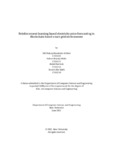| dc.contributor.advisor | Alam, Md. Golam Rabiul | |
| dc.contributor.author | Moti, Md Mahraj Murshalin Al | |
| dc.contributor.author | Uddin, Rafsan Shartaj | |
| dc.contributor.author | Anik, Abdul Hai | |
| dc.contributor.author | Saleh, Tanzim Bin | |
| dc.date.accessioned | 2021-09-04T05:19:45Z | |
| dc.date.available | 2021-09-04T05:19:45Z | |
| dc.date.copyright | 2021 | |
| dc.date.issued | 2021 | |
| dc.identifier.other | ID 17101301 | |
| dc.identifier.other | ID 17101311 | |
| dc.identifier.other | ID 17101312 | |
| dc.identifier.other | ID 17101310 | |
| dc.identifier.uri | http://hdl.handle.net/10361/14968 | |
| dc.description | This thesis is submitted in partial fulfillment of the requirements for the degree of Bachelor of Science in Computer Science and Engineering, 2021. | en_US |
| dc.description | Cataloged from PDF version of thesis. | |
| dc.description | Includes bibliographical references (pages 48-51). | |
| dc.description.abstract | Electricity is deeply integrated into both our modern society and the economy. However, with our ever-growing society and increasing demand for electricity, the scarcity
of resources is deeply felt through load shedding in most third world countries. Moreover, since most of the world depends on electricity systems built around more than
60 years ago, they are becoming increasingly inefficient and fail to solve the problems
of modern-day global challenges. A Smart grid is an intelligent electricity network that
allows efficient and optimal electricity distribution from source to consumers through
smart integration of power technologies, information, and telecommunication through
the existing system. The current system is a one-way interaction that only supplies
electricity to consumers. That limits the ability to respond to the ever-changing and
rising demands of society. However, smart grids allow the exchange of electricity and
information between producers and customers. A smart home will communicate with
the grid and allow consumers to manage electricity usage through a smart meter efficiently, and that will also efficiently manage electricity bills. Inside a smart home, the
Home Area Network (HAN), will integrate all smart appliances into one energy management system so that these appliances can adjust the run schedule to lessen the
demand on electricity at peak times, therefore, lowering bills. Reinforcement learning
and a decentralized local market through block-chain can be used for electricity load
and price forecasting. It is possible to fine-tune parameters to increase overall distribution and performance through efficient feature selection and feature extraction
methods. The use of block-chain will connect prosumers and suppliers in a secure and
decentralized system that will be used to forecast usage and bills. Also, through the
use of reinforcement learning techniques and the block-chain’s information, it will be
possible to analyze prosumer behavior. So, the integration of block-chain and smart
grids will increase flexibility and scalability, leading to an overall optimized system. | en_US |
| dc.description.statementofresponsibility | Md Mahraj Murshalin Al Moti | |
| dc.description.statementofresponsibility | Rafsan Shartaj Uddin | |
| dc.description.statementofresponsibility | Abdul Hai Anik | |
| dc.description.statementofresponsibility | Tanzim Bin Saleh | |
| dc.format.extent | 51 pages | |
| dc.language.iso | en | en_US |
| dc.publisher | Brac University | en_US |
| dc.rights | Brac University theses are protected by copyright. They may be viewed from this source for any purpose, but reproduction or distribution in any format is prohibited without written permission. | |
| dc.subject | Smart Grid | en_US |
| dc.subject | Block-chain | en_US |
| dc.subject | Price Forecasting | en_US |
| dc.subject | Electricity demand and supply | en_US |
| dc.subject | Smart Meter | en_US |
| dc.subject | Reinforcement Learning | en_US |
| dc.subject.lcsh | Reinforcement learning. | |
| dc.title | Reinforcement learning based electricity price forecasting in Blockchain based smart grid environment | en_US |
| dc.type | Thesis | en_US |
| dc.contributor.department | Department of Computer Science and Engineering, Brac University | |
| dc.description.degree | B. Computer Science | |

